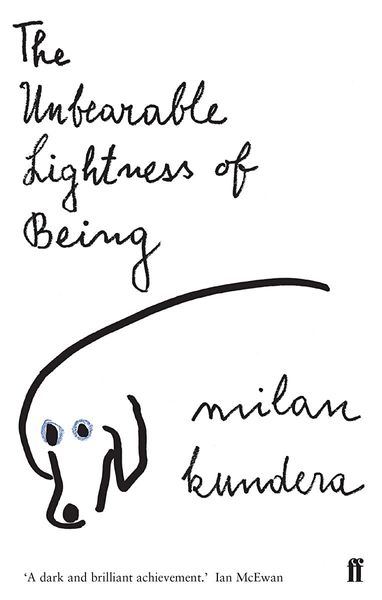
The Unbearable Lightness of Being
'A cult figure.' Guardian 'A dark and brilliant achievement.' Ian McEwan 'Shamelessly clever ... Exhilaratingly subversive and funny.' Independent 'A modern classic ... As relevant now as when it was first published. ' John Banville A young woman is in love with a successful surgeon - a man torn between his love for her and his incorrigible womanising. His mistress, a free-spirited artist, lives her life as a series of betrayals - while her other lover stands to lose everything because of his noble qualities. In a world where lives are shaped by irrevocable choices and fortuitous events, and everything occurs but once, existence seems to lose its substance and weight - and we feel 'the unbearable lightness of being'. A masterpiece by one of the world's truly great writers, Milan Kundera's The Unbearable Lightness of Being encompasses passion and philosophy, infidelity and ideas, the Prague Spring and modern America, political acts and private desires, comedy and tragedy - and illuminates all aspects of human existence. What readers are saying: 'Some books change your mind, some change your heart, the very best change your whole world ... A mighty piece of work, that will shape your life forever.' 'One of the best books I've ever read ... A book about love and life, full of surprises. Beautiful.' 'This book is going to change your life ... It definitely leaves you with a hangover after you're done reading.' 'A must read - loved it, such beautiful observations on life, love and sexuality.' 'Kundera writes about love as if in a trance so the beauty of it is enchanting and dreamy ... Will stay with you forever.' 'A beautiful novel that helps you understand life better ... Loved it.' 'One of those rare novels full of depth and insight into the human condition ... Got me reading Camus and Sartre.' 'One of the best books I have ever read ... An intellectual love story if ever there was one.'
Reviews
nattie@nattierose
Karmen @karmentorralba
py@gojoscutegf
kae@thearcherchild
Apurva Shah@apurvashah
rebi🦇@digivamp
sam@smrh01
Maureen@bluereen
Sajiya Chaudhary@sajiya_khalik
Louisa@louisasbookclub
Elisavet Rozaki @elisav3t
nen@petitfleurdumal
Anh Nguyen@anhs
Colton Ray@coltonmray
Efe@readwithefe
Lily Cooper@lilyylouise
jack@statebirds
Jyc@joeesuuu
y✦@y4ndsl
lexie@lexiereads
Ivy Vatsala@ivy93
Geetika @geetening
Mia Caven@miacaven
Dimitris Papastergiou@s4murai
Highlights
nattie@nattierose
Page 183
nattie@nattierose
Page 208
nattie@nattierose
Page 103
bee@blssng
bee@blssng
bee@blssng
bee@blssng
han@pistachio
Page 139
han@pistachio
Page 118
kae@thearcherchild
Page 11
pia@kahidlawakan
pia@kahidlawakan
pia@kahidlawakan
pia@kahidlawakan
pia@kahidlawakan
pia@kahidlawakan
pia@kahidlawakan
pia@kahidlawakan
Lily Cooper@lilyylouise
Maria Buitrago@mariabuitrago
Maria Buitrago@mariabuitrago
Magda @chittii
Daria claymore@dariaclaymore
Elina Berzina@elinabrzn